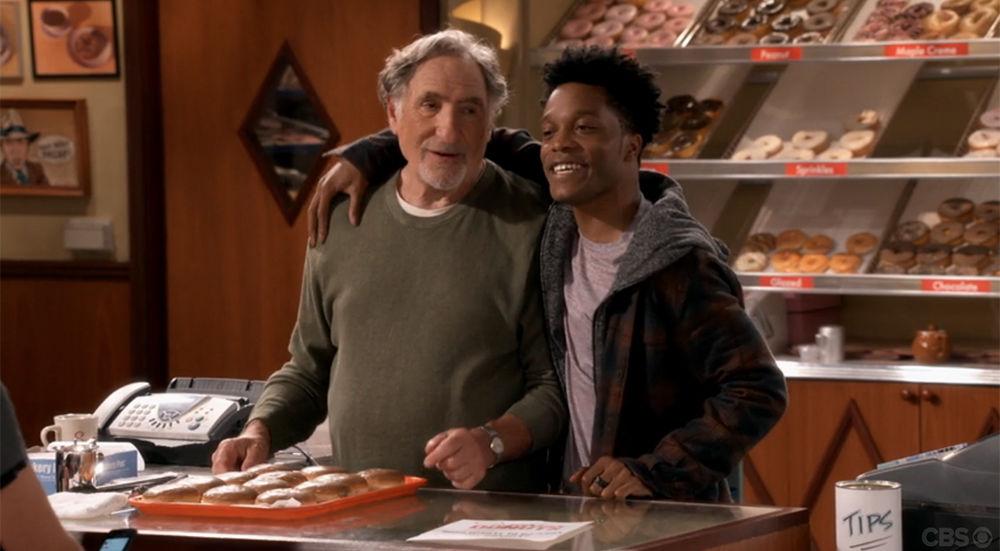Doughnuts have a precious window of freshness. Even the most revered doughnuts eventually turn into stale shells of their former selves, equivalent to those that spend most of their lives decaying in an acrylic case at a gas station. Gas station doughnuts are predictable, flavorless and disappointing — just like CBS’s “Superior Donuts” pilot.
The show is a valiant attempt to bridge the gap between generations. Naturally, a man stuck in his ways, Arthur (Judd Hirsch), can’t run a doughnut shop that caters to the trend-adapting, impulsive millennial. His standard customers are a grad student, two cops and a man juggling odd jobs that spit out of a fax machine.
Facing gentrification, Arthur is tempted to sell off his doughnut shop. His life takes a turn when a hip, wholesome teen, Franco (Jermaine Fowler), shows up for a job interview out of the blue. Like hundreds of other sitcoms, a most unlikely duo comes together for a greater good. In this case, it’s to compete with the Starbucks across the street.
If I wasn’t annoyed by the predictable character roles and edgy stereotypes, I was constantly reminded of the criminal climate in Chicago. While it’s the foundation of the show, the formulaic jokes of danger and gentrification appeared every two minutes.
For example, Franco spoke of his past two employers that were turned into a Whole Foods and Old Navy. Shortly after, he boasted that he “refuses to work for some greedy-ass corporation that’s ripping the soul out of the neighborhood [he] grew up in.”
After Franco calls the establishment a “doughnut museum” and coaxes Arthur with his savvy marketing skills, he gets the job. Franco tells Arthur he “built something here and it deserves to live on,” restoring a twinkle in his eye. For once, the crusty man has a lust for life and believes he can compete against the leading coffee company in the world.
A haughty real estate tycoon tempts Arthur to sell his shop throughout the series, claiming that the youth are only interested in “drinking kale smoothies and not vaccinating their children.”
Arthur hesitantly loans Franco $200 from his “emergency fund,” which he hasn’t touched in years, because he’s a stingy old man who probably only spends money on crossword puzzles and discounted bagels.
Accordingly, the marketing guru gets a dancing donut mascot, a folding chalkboard and forges reviews on Yelp to attract customers. Franco reveals a painting he coined “Arthur in the Sky with Donuts” which I found more cringe-worthy than sentimental.
Arthur gazes off into the distance and recalls what life was like when people actually wanted to eat his doughnuts. Characteristic of any restaurant in the “good ole days,” smoke filled the air and a jukebox was on full blast. After the uncharismatic moment of nostalgia, a millennial couple walks in.
The girl, enthralled by how “retro” the store is, asks for a grande macchiato. As any pretentious millennial, her eyes were glued to her phone and couldn’t take “no” for an answer. After denying Arthur’s famous maple cream doughnuts, the couple voyaged to the Starbucks across the street.
Franco suggests that Arthur buy an espresso machine, which prompts a fight between the two. It’s the typical “I’m not ready for change even though you might be right” argument.
Overnight, Franco defaces the Starbucks sign out of frustration.
When the cops came in to question Arthur about Franco, the jukebox starts playing as if it were a Christmas miracle. The Starbucks owner, who is stereotyped as gay, demands that the teen be arrested. Arthur covers for Franco, but the cops don’t believe it.
Arthur digs into his emergency money, which is in a shoe, of course, because every child who grew up in the Great Depression doesn’t trust the banks. He offers the money to Starbucks to repair the sign. Franco apologizes for his delinquency and thanks Arthur for believing in his vision.
All is well again.
If the show continues to air, I predict that hipsters will fall in love with the place. It’s a modest business’s picturesque resilience against a soulless chain.
Overall, it’s a lackluster effort. This is the type of show that comes on in a waiting room and you watch it only because it’s unavoidable and you’re painfully bored. Catch it Monday nights at 9 p.m. on CBS.













